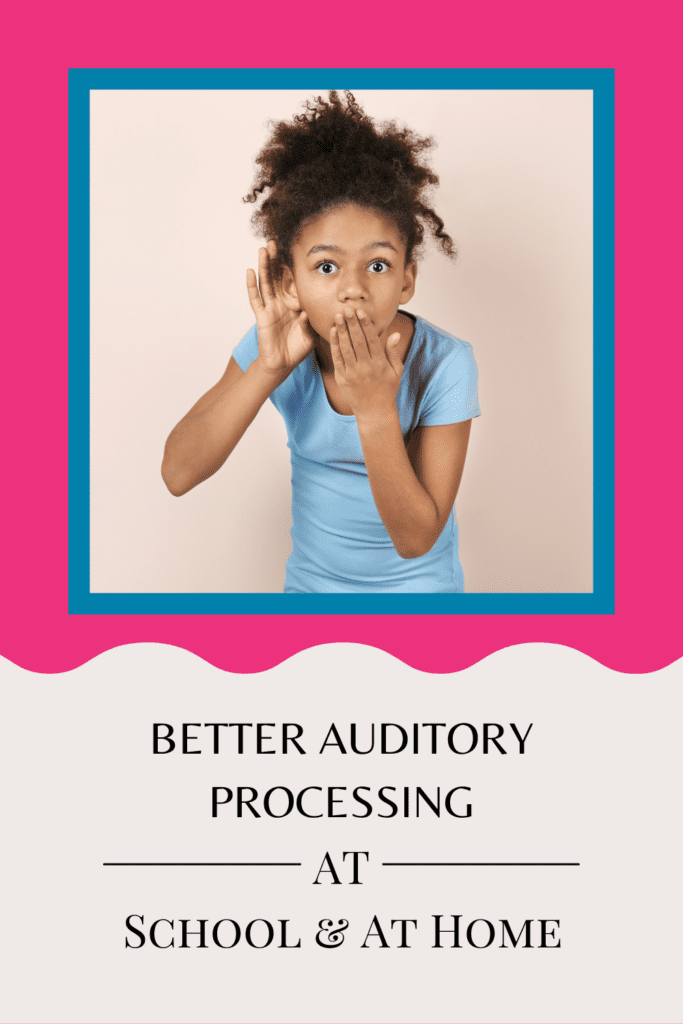Last week a client whose daughter had Auditory Processing Disorder felt she had to justify her reasoning for her child having an IEP. “I know you’re against them,” she said.
I was taken aback because I haven’t exactly been shy about my frustrations with IEPs as a permanent solution, but that doesn’t mean that I am against them.
The purpose to IEP’s is to help a child make gains in their learning or behaviour. My frustration as a teacher was that too often because of lack of funding, resources and over crowded classrooms, IEPs are often permanent solutions rather than temporary measures. I am definitely not against them!
IEP Accommodations that Can Help with Auditory Processing Disorder
For a lot of kids, IEP’s can help to manage a situation, keep a child afloat and increase their confidence and motivation. Ideally, they will help a child improve so the IEP is no longer needed.
In the case of auditory processing disorder, a well thought out IEP that is followed can seriously help a child with focus and to better learn.
My top recommendations to manage auditory processing challenges until the root cause has been addressed both in terms of an IEP as well as strategies at home are:
1) Reduce background noise
Whether it is in the classroom or doing homework at home, ensuring your child has a quiet room to work is essential. Remember that kids with auditory processing issues often have a hard time filtering out background noise.
If your child’s classroom is noisy, then push for your child to be allowed to go work somewhere quiet away from distractions. Noise cancelling headphones can also be helpful for situations where background noise cannot be avoided.
2) Preferred seating
Your child should be seated near the teacher where your child can see the teacher and rely on their facial expressions, body language is necessary and other visuals like the board.
3) Visual cues
Visual schedules, reminders and clear body language can be especially helpful in getting your child to focus and retain information both at home and at school.
4) Speak slowly
Kids with auditory processing issues need more time to process. When we talk fast, the message is more likely to go over their head. Teaching your child to use a subtle hand signal for both you and the teacher to slow down if they are talking to fast can help your child to process the meaning of the speaker’s words.
5) Heads up
Avoid just diving into an explanation. Giving a child with APD a cue that they need to focus by telling them, “I need you to pay attention to me right now” or “Are you ready?” will increase the chances that your child actually takes in the message. Both at home and at school, regular ‘checks for understanding’ after your child has been given an explanation can ensure they accurately received the message.
6) Say Less
Avoid going into unnecessary and overly detailed explanations. This is where you lose a child with auditory processing disorder. Too many words and explanations creates auditory overwhelm. Use less words, and focus on key words instead. As much as possible, show rather than tell.
7) Extra Response Time
Children with auditory processing need more time to process information. Ensure you and their teacher understands that your child may need time before immediately responding in a conversation or to a question.
8) Behaviour is a Barometer
There are many reasons that children have behaviour issues, and frustration is one of them. If your child is doing okay but you notice that as they are doing their work or taking in information that their behaviour becomes worse – slow down.
See this as a signal that they are experiencing auditory overwhelm and need information in either smaller chunks or they may simply need to take a break.
If you’re done with band-aid approaches as the only solution, then book a free Better Brains Breakthrough call here.
Wishing you and your family health & wholeness,
Lorraine
